“The safety of the people shall be the highest law.” – Marcus Tullius Cicero, Roman statesman, lawyer, and philosopher
Hansmukh Bhai Gujjar has been a part of IIT Gandhinagar for the last ten years. A resident of a locality near Visat close to the Sabarmati area in Ahmedabad, he works as a housekeeping staff at the Institute and is responsible for maintaining cleanliness inside the campus along with his other team members.
When asked about the current COVID-19 pandemic that is engulfing the world at an alarming pace, he said that he understands the importance of washing hands frequently with soap and water and maintaining social (physical) distancing. Issued by the health officials and promoted by the Government of India, these preventive measures are playing an integral role in combating this fast-spreading viral illness, and Hansmukh Bhai urges everyone to follow these guidelines strictly.
Elaborating further, he added that most of the housekeeping staff is trying to stay at the campus, as advised by the Institute authorities, to ensure that the lockdown rules are being properly followed. “Commuting between our houses and the campus every day is troublesome in these times. It is even more problematic when this distance is large, such as for me, it is a total of around 40 km every day. This traveling will not only expose us to the risk of contracting the coronavirus disease but is also the cause of our worries that our families might develop this illness too. So, we stay safely at the campus and are aware that it is for the wellbeing of all,” he explained.
“I am scared of this crisis – COVID-19 neither has a treatment, nor a vaccine as of now. Hence, following the precautions is our best shot at success. We should also try to boost our immunity by taking a balanced diet and doing exercise regularly,” he added.
When asked about the ways in which SARS-CoV-2 has affected his lifestyle, Hansmukh Bhai expressed that the lack of social interactions with others is the biggest change that he has come across. People cannot sit, eat, and chat together in groups anymore. The only way to connect with one another is by using mobile phones and the internet. While it is an effort to protect everyone from the clutches of this disease, it is also causing some restlessness as human beings are social animals.
In his words, “Amidst this situation of continuous lockdown imposed by the Government, IIT Gandhinagar is providing us with hygienic places (rooms) to live and healthy food to eat (four times a day). We are being given all the essential services and basic necessities, and all this has made our stay at the campus peaceful.”
Hansmukh Bhai also discussed that the current situation is not only wreaking havoc in terms of endangering our health, but also fueling the problem of unemployment. Many lower-class and lower-middle-class people are losing their jobs and are not getting salaries to support their families, and it is an issue of grave concern. According to him, “We are a family of four – two sons, my wife and me. We all were associated with housekeeping work at different organizations. But, because of this disease, my wife and sons lost their jobs. Now, I am the only one who is earning bread and butter for the family. This situation is sad. But, I would really like to thank IIT Gandhinagar as it is really helping me take care of my family in these tough times. If I had lost my job as well, it would have been very difficult for us to survive.”
He feels that it might take time but eventually, things will go back to normal in the future. He is hopeful that this period of panic and sadness will end, sooner or later. In the end, Hansmukh Bhai is proud to be a part of the IIT Gandhinagar family – a place that is supporting him and standing united with him in these times of need…
“Leaders become great, not because of their power, but because of their ability to empower others.” – John Maxwell, author, speaker, and pastor
— — — — — — — — — — — — — — — — — — — — — — — — — —— — — — — — — — — — — — — — — — — — — — — — — — — —— — — — —
This article is authored by Apeksha Srivastava, with help from Devarsh Barbhaya.

